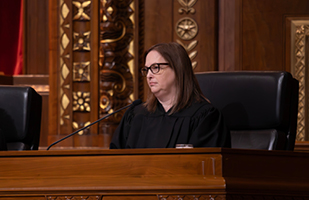Judge Finds Her Way by Learning From Others

Judge Betsy Luper Schuster has been on the appellate bench since 2014.

Judge Betsy Luper Schuster has been on the appellate bench since 2014.
When Judge Betsy Luper Schuster was figuring out what direction to take with her career as a philosophy major, she remembers people telling her, “You can do anything with a law degree.” She has proven it in a variety of positions in the private and public sectors, academia, and now serving on the Supreme Court of Ohio.
“I had many strong mentors in my life from my parents, [former Attorney General] Betty Montgomery, and [former Justice] Judi French,” said Judge Luper Schuster, who sat Wednesday for a Supreme Court case as an assigned visiting judge.
“My advice when I speak to law students and young lawyers is to cultivate mentorships because those people get to know you and what might be the best fit for you. They can help you get to that next step because they can recognize the quality of your work and talents.”
Judge Luper Schuster has been on the Tenth District Court of Appeals since being appointed by then-governor John Kasich in 2014, and has since been elected to the position. Before the bench, she was part of the selection process for appointments as chief counsel for the governor. One of her duties in that role was to interview and recommend candidates for judicial vacancies.
“For prospective judges, I valued people with a wide range of experiences who were invested in continually learning and expanding their knowledge of the law,” said Judge Luper Schuster. “Judges have to be thoughtful and considerate when hearing and assessing all arguments in each case.”
In that role, Judge Luper Schuster realized she had similar experience to attorneys seeking an appointment, especially on the appellate bench. An appeals judge must manage a wide range of cases. So does a hearing officer or commissioner, positions the judge held earlier in her career. She heard claims for multiple state agencies, applying the law on cases ranging from reimbursing crime victims to suspended teaching licenses.
“Whether you’re a judge or a hearing officer, you’re an integral part of a system that is built on checks and balances. Your main duty is to uphold the law and rules in place to make sure the process is fair, and each party gets the chance to be heard,” said Judge Luper Schuster.
She adds those expectations are magnified when sitting for the Supreme Court, like she did this week. Judge Luper Schuster sat for Justice Joseph T. Deters, who recused. The Ohio Constitution gives the chief justice authority to select an appellate judge to sit for a Supreme Court case when there is a justice recusal. Chief Justice Sharon L. Kennedy assigned Judge Luper Schuster to hear the case of State v. Jones. The criminal case calls into question the constitutionality of a sweep and search of an alleged drug house.
“It’s an honor to sit for the Supreme Court because the justices only accept cases that are of great public concern,” said Judge Luper Schuster. “The amount of thought and work that goes into these cases is significant where few people are entrusted with that kind of responsibility. Fortunately, I’ve had some good mentors along the way who saw that potential in me.”


